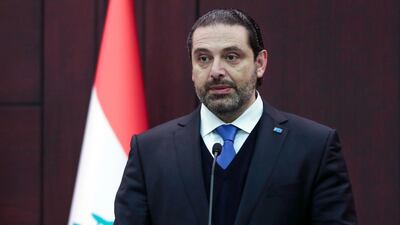Lebanon’s Prime Minister Saad Hariri has accused Israel of a blatant attempt to interfere in its territory and put international companies off bidding for oil and gas rights.
Lebanon sits on the Levant Basin in the eastern Mediterranean where a number of large sub-sea gas fields have been discovered since 2009, including the Leviathan and Tamar fields located in Israeli waters near the nations' disputed marine border.
On Wednesday, the issue of an offshore oil and gas exploration tender in Beirut prompted anger from Israel's defence minister, Avigdor Lieberman, who described the move as "very provocative". Lebanon has put out a tender for a gasfield that "is by all account ours", Mr Lieberman said, urging international firms not to bid.
He was referring to an area called Block 9, which borders Israeli waters.
The remarks led Mr Hariri to slam the Israeli minister's statement as a "blatant provocation that Lebanon rejects".
Israel's claim is "invalid in form and substance and comes within Israel’s expansionist policies to undermine the rights of others and threaten regional security", Mr Hariri said.
The Lebanese government will follow up the tender "with the competent international parties to assert its legitimate right to act in its territorial waters", he added.
Lebanese president Michel Aoun also described Israel's comments as "a threat".
"Lieberman's words about Block 9 are a threat to Lebanon and its right to sovereignty over its territorial waters," the president said on Twitter.
Lebanon in December approved a bid by a consortium of France’s Total, Italy’s Eni and Russia’s Novatek for two of the five blocks put up for tender in the country’s much-delayed first oil and gas offshore licensing round.
On Thursday, Lebanese officials and analysts said they did not expect Israel’s claims to affect the recently approved bids.
"The process is on track," said Nassib Ghobril, chief economist at Byblos Bank in Beirut. "The companies know the political risks and they’re familiar with the region.”
An official from the Lebanese Petroleum Association told The National that the formal signing of the contracts was still planned for February 9. Other officials have said exploration in the area could begin as soon as next year.
The biggest problem with Lebanon’s potential reserves is that they are unproven.
"Irrespective of Israeli threats, we have a local challenge in Lebanon of toning down expectations," he said. "We have no idea how easy or difficult it is to extract or whether we have enough to commercialise. It's way too early to claim we have joined the ranks of oil and gas producing countries, as some politicians have."
The same companies explored blocks in Cyprus last year without finding significant quantities of oil or gas, he added.
If Lebanon does prove to have significant reserves, production would likely take at least another five years to begin. Bringing gas on to the export market would be still another challenge, particularly in an energy environment where supply outstrips demand.
According to some government estimates, Lebanon's territorial waters could hold as much as 96 trillion cubic feet of natural gas and 850 million barrels of oil. If proven, extraction of those resources could translate into huge savings for the country’s debt-ridden economy and end its dependence on fuel imports.
Last month, Lebanese foreign minister Gebran Bassil filed a formal complaint with the United Nations over Israel's claims to the territory.
Lebanon and Israel are still officially at war, and their border has never been formally agreed to. Block 9, as well as three other blocks, border Israeli territorial waters along the current line of control, which is monitored by the UN's Interim Force in Lebanon, as well as the Lebanese and Israeli militaries.
Mr Hariri has previously suggested the US might mediate in the dispute.
"We would like to see a resolution to this dispute that is acceptable to both parties," a US State Department official said Thursday.
Israel already extracts gas from its territorial waters in the Mediterranean, and has plans to increase its extraction capacity in coming years.

